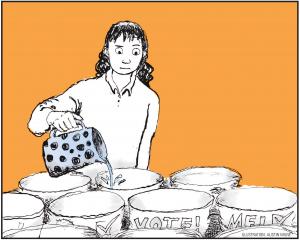
Dunedin City Council candidates Steve Walker and Joy Davis pledged to support policies consistent with a 57-page document that sets out the Labour Party’s values, visions and priorities for policy.
That includes positions such as commitment to the Treaty of Waitangi, a strong economy and a healthy environment.
If both are elected, they will be expected to work together and with other councillors.
"Like all councillors, they need to work constructively with their colleagues to achieve any policy goals," Labour Party candidate selection panel chairwoman Ruth Chapman said.
"Candidates for local-body positions — and therefore councillors — need to develop policy responses on a whole range of issues, most of which are situated in a local context," Ms Chapman said.
"Obviously, they are generally in tune with Labour's values and goals but the specific responses are to the unique characteristics of each situation as it presents itself and it is the councillors' responsibility to develop those responses."
Obligations council candidates backed by political parties may have to those parties have been the focus of some discussion on social media and Dunedin city councillor Lee Vandervis drew attention to Labour’s constitution and a candidates’ pledge.
Cr Walker was perplexed by a reference from Cr Vandervis to bloc voting along central government lines when he was the only city councillor endorsed by Labour in the past term.
Candidates were under no agreement to abide by Labour Party policy or vote in any particular way, Cr Walker said.
"I have stated publicly too many times to remember that if I was ever contacted by anyone from Labour suggesting I should vote in a particular way, that not only would I refuse, I would also immediately resign from the party."
This term, he voted for a council submission expressing clear opposition to the Government’s proposed Three Waters service delivery model.
Mrs Davis said, if elected, she would make evidence-based decisions for the benefit of the city and its residents.
Ms Chapman said voters could clearly see what candidates stood for and most appreciated this.
"We believe that is a more honest approach than not revealing allegiances and affiliations."
Ms Chapman described Labour’s 57-page policy platform as a high-level document focused on national issues.
It was less detailed than the party’s manifesto and councillor obligations were locally focused.
Dunedin Mayor Aaron Hawkins, who alongside Marie Laufiso is endorsed by the Green Party, said he was being upfront about his values.
"Our candidates are running to support Green values and, where it’s relevant, party policy in local government," Mr Hawkins said.
"To be honest though, there’s not a lot of party policy that is directly relevant to local government.
"It certainly hasn’t stopped us being critical of government when their decisions aren’t in Dunedin’s best interests.
"We have opposed proposed water reforms, for example, and are seeking categorical reassurances around the new Dunedin hospital."
The Team Dunedin political organisation did not have Labour-like documents, ticket leader and mayoral candidate Jules Radich said.
"We are all independent candidates that come together to stand for what is best for Dunedin."
Labour also has Bill Southworth standing for the Otago Regional Council and the Green Party endorsed Alan Somerville for the regional council.












